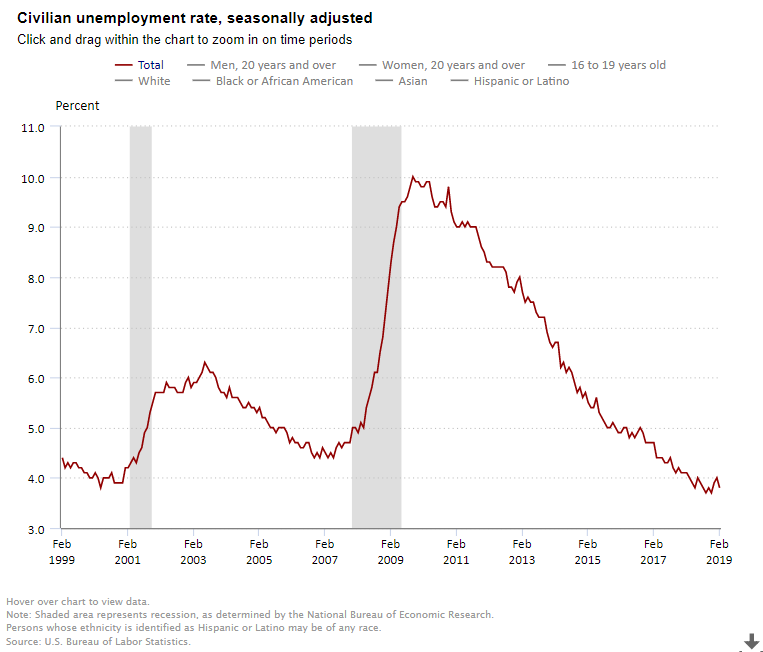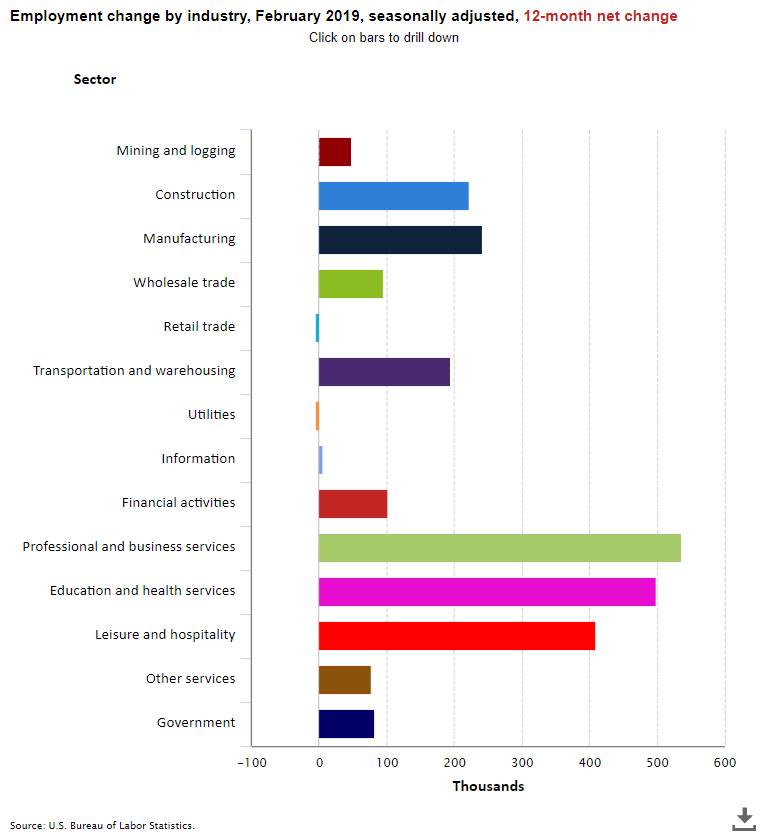The Labor Department reported that there were only 20,000 jobs added in February, well below the consensus expectation of 180,000. This marked the 101st consecutive month of job growth. While February was weak, January was very strong. The latest three-month average is 186,000, less than last year’s 223,000 monthly average but consistent with more modest growth anticipated for 2019.

January was revised up from 304,000 to 311,000 and December was revised up from 222,000 to 227,000. Combined, employment gains in December and January were 12,000 more than previously reported. Monthly revisions result from additional reports received from businesses and government agencies since the last published estimates and from the recalculation of seasonal factors.
In February, employment in health care rose by 21,000. In the past year, health care has added 361,000 jobs.
The unemployment rate fell 0.2 percentage points to 3.8% in February. A broader measure of unemployment, which includes those who are working part time but would prefer full-time jobs and those that they have given up searching—the U-6 unemployment rate—fell to 7.3% from 8.1%. This was the lowest rate since 2000. The federal government shutdown may have affected this figure.
Average hourly earnings for all employees on private nonfarm payrolls rose in February by eleven cents to $27.66. Over the past 12 months, average hourly earnings have increased by 3.4%, a new cycle high.

The labor force participation rate, which is a measure of the share of working age people who are employed or looking for work held steady at 63.2% in February, still very low but up from its cyclical low of 62.3% in 2015. The low rate at least partially reflecting the effects of an aging population.
This report, in combination with other recent data on economic activity, will support the Fed’s recent position of pausing interest rate increases. In February, Federal Reserve Chairman Powell indicated that the Fed would not be raising interest rates in the immediate future due to concerns about global economic growth and limited inflation. In December, the Federal Reserve had raised the fed funds rate by 25 basis points to a range of 2.25% to 2.50%. That marked the fourth increase in 2018. The Fed has now raised rates by a quarter percentage point nine times since late 2015, after keeping them near zero for seven years.
About Beth Mace
Beth Burnham Mace is a special advisor to the National Investment Center for Seniors Housing & Care (NIC) focused exclusively on monitoring and reporting changes in capital markets impacting senior housing and care investments and operations. Mace served as Chief Economist and Director of Research and Analytics during her nine-year tenure on NIC’s leadership team. Before joining the NIC staff in 2014, Mace served on the NIC Board of Directors and chaired its Research Committee. She was also a director at AEW Capital Management and worked in the AEW Research Group for 17 years. Prior to joining AEW, Mace spent 10 years at Standard & Poor’s DRI/McGraw-Hill as director of its Regional Information Service. She also worked as a regional economist at Crocker Bank, and for the National Commission on Air Quality, the Brookings Institution, and Boston Edison. Mace is currently a member of the Institutional Real Estate Americas Editorial Advisory Board. In 2020, Mace was inducted into the McKnight’s Women of Distinction Hall of Honor. In 2014, she was appointed a fellow at the Homer Hoyt Institute and was awarded the title of a “Woman of Influence” in commercial real estate by Real Estate Forum Magazine and Globe Street. Mace earned an undergraduate degree from Mount Holyoke College and a master’s degree from the University of California. She also earned a Certified Business Economist™ designation from the National Association of Business Economists.
Connect with Beth Mace
Read More by Beth Mace